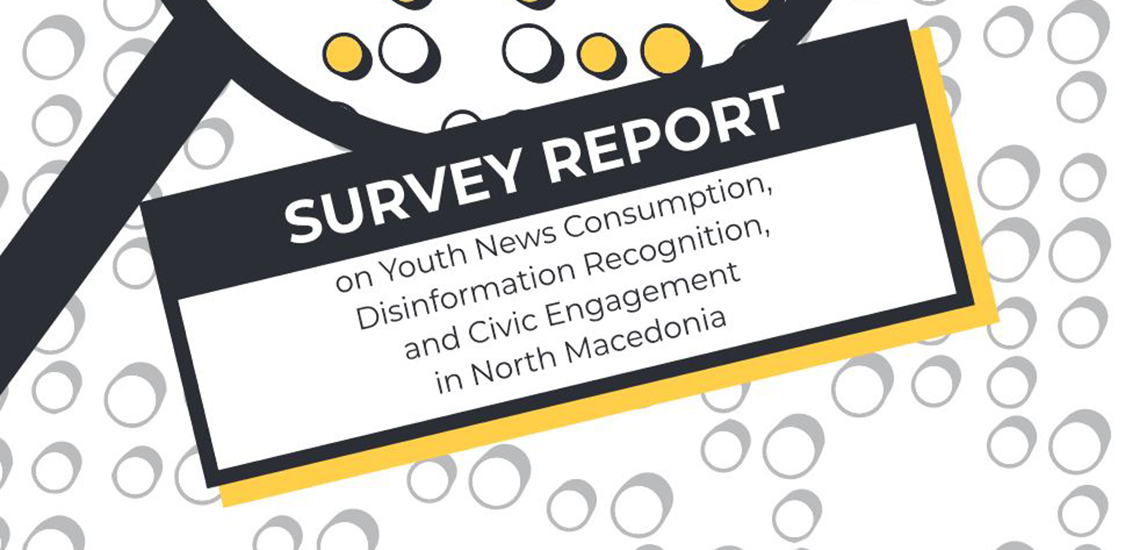
Survey: A quarter of the youth spend a worryingly large amount of time on social media; they neither search for nor react to news and their “political voice” is not heard
For the majority of young people, Instagram, Facebook and YouTube are the most interesting platforms for keeping up with latest events, and news about education, science and technology are the most attractive to them. Although they believe that only some of the information on social media is true and almost a quarter of them spend a worryingly large amount of time on social media, actively searching for and reacting to information is not common for young people. They consider themselves able to recognize disinformation in the media, but more than half may have shared disinformation without knowing it. According to young people, politics and political parties are the biggest source of disinformation. At the same time, their political views on social developments in the country are mute.
This is shown by the survey conducted by the Institute of Communication Studies (ICS) in the run-up to the presidential and parliamentary elections, the purpose of which is to determine the habits of media and news consumption among young people, their ability to recognize disinformation in the media and what their civic and political engagement is.
More often than not, young people consume news passively, i.e., they more often come across news while doing other things than actively searching for and checking the information. Reading news often leads to them sharing it verbally or online with friends and colleagues and reading other people’s comments on social media news posts, but it is not as common for them to directly and publicly react, i.e., write their own comment on a certain news item. In terms of topics, young people are less interested in political developments in the country, the economy and social justice, and they have detected disinformation or misinformation about politics, celebrities and crime and corruption.
Young people have a critical stance when it comes to the accuracy of the shared information, yet they focus very little on identifying the emotional tone of the news, which should be paid more attention to in media literacy education. They consider themselves to be successful in recognizing disinformation, although over half of them (51%) responded that they may have shared it without knowing it was disinformation. Only 13.4% believe that most of the information on social media is true, and 34.3% reported the presence of disinformation in the media. Almost 2/3 of the young respondents believe that the main creators of disinformation are political parties.
Among the surveyed young people, there is a marked interest in public affairs. Regarding their civic engagement, over half (53%) of the respondents said that they have been involved in some kind of volunteering activity aimed at solving local problems. In terms of electoral engagement, 39.8% of respondents declared that they vote regularly, and 16.7% vote sometimes. But when they were asked about their “political voice”, the most common answer of the young respondents was “I haven’t done that” for a list of potential activities that are a demonstration of political opinions in relation to certain social developments, such as: charity fundraisers, protesting, meeting with a political official, signing a written petition, boycotting a company because of its social values, etc.
Regarding the use of social media, 5% of respondents belong to the critical group of high social media addiction, but the percentage of respondents (19%) that are close to the critical cut-off score for diagnosing such addiction is also notable. Anxiety can be noticed in people who are addicted to social media, especially when social media are not available; they constantly check their phones when the notification sound comes on; when posting a picture on social media, comments and likes are constantly checked: using social media is the first and last thing in the day, i.e., a normal routine; events are rated by how “postable” they are.
The survey was conducted in the period from December 2023 to March 2024, on a sample of 345 respondents aged 18 to 29, with varied demographic and socioeconomic backgrounds (high school students, university students, unemployed and employed persons). The research is part of the “Use Facts” project, supported by the British Embassy in Skopje.
The survey on news consumption, disinformation recognition and civic engagement among young people is available here:

